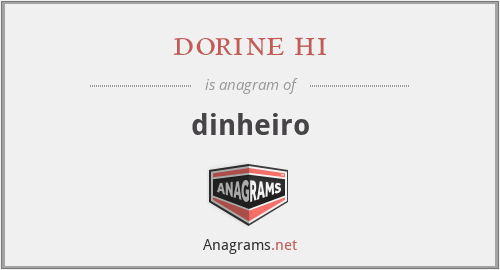What anagrams are available for dinheiro?
This page is about an anagram for the word dorine hi that can be used in word games, puzzles, trivia and other crossword based board games.
dorine hi
Translation
Find a translation for dorine hi in other languages:
Select another language:
- - Select -
- 简体中文 (Chinese - Simplified)
- 繁體中文 (Chinese - Traditional)
- Español (Spanish)
- Esperanto (Esperanto)
- 日本語 (Japanese)
- Português (Portuguese)
- Deutsch (German)
- العربية (Arabic)
- Français (French)
- Русский (Russian)
- ಕನ್ನಡ (Kannada)
- 한국어 (Korean)
- עברית (Hebrew)
- Gaeilge (Irish)
- Українська (Ukrainian)
- اردو (Urdu)
- Magyar (Hungarian)
- मानक हिन्दी (Hindi)
- Indonesia (Indonesian)
- Italiano (Italian)
- தமிழ் (Tamil)
- Türkçe (Turkish)
- తెలుగు (Telugu)
- ภาษาไทย (Thai)
- Tiếng Việt (Vietnamese)
- Čeština (Czech)
- Polski (Polish)
- Bahasa Indonesia (Indonesian)
- Românește (Romanian)
- Nederlands (Dutch)
- Ελληνικά (Greek)
- Latinum (Latin)
- Svenska (Swedish)
- Dansk (Danish)
- Suomi (Finnish)
- فارسی (Persian)
- ייִדיש (Yiddish)
- հայերեն (Armenian)
- Norsk (Norwegian)
- English (English)
Definition
What does dinheiro mean?
- dinheiro
- The dinheiro was the currency of Portugal from around the late 12th century until approximately 1502. For accounting purposes, twelve dinheiros equalled one soldo and twenty soldos equal one libra (pound). The basis of the monetary system was that of the Roman Empire (denarii, solidi, librae). The first Portuguese coins were issued by the first king, Afonso I. Some time after 1179, he ordered the issue of coins in denominations of half a dinheiro (called a mealha) and one dinheiro. They were copied from the Spanish dinero and were consequently minted in billon. These circulated alongside Byzantine siliquae and Moorish dirhem and dinar. Around 1200, Sancho I also introduced the gold morabitino (from the muslim maravedi), worth 15 soldos. A century later, in the reign of King Denis, the silver tornês was introduced, worth 5+1⁄2 soldos. In 1380, King Ferdinand I introduced several new coins. There were gold dobra, worth 6 libras, silver real worth 10 soldos and various billon denominations, some of whose names related to war equipment used by the French who helped Portugal in the war against Castile, such as the pilarte worth seven dinheiros. During the reign of King João I, a new real was introduced, known either as the "real of 3+1⁄2 libras" or the "real branco". With a value of 70 soldos, this was to become the unit of account by the beginning of the reign of João I's successor (King Duarte I) in 1433. Note that in modern Portuguese, the word "dinheiro" means "money".
Embed
Citation
Use the citation below to add this anagram to your bibliography:
Style:MLAChicagoAPA
"dorine hi." Anagrams.net. STANDS4 LLC, 2024. Web. 11 May 2024. <https://www.anagrams.net/term/3810839>.



Discuss this dinheiro anagram with the community:
Report Comment
We're doing our best to make sure our content is useful, accurate and safe.
If by any chance you spot an inappropriate comment while navigating through our website please use this form to let us know, and we'll take care of it shortly.
Attachment
You need to be logged in to favorite.
Log In